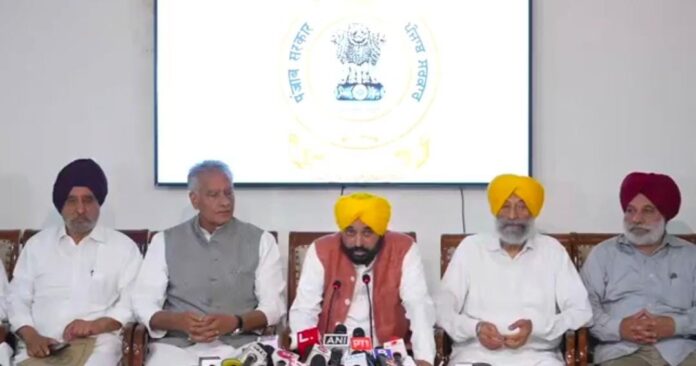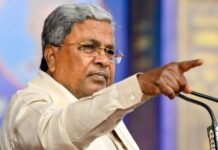
Chandigarh: The historic Punjab-Haryana water issue assumed a new twist today with the Punjab Government hosting an all-party meeting to protest against the so-called unfair distribution of river waters by the Bhakra Beas Management Board (BBMB). The meeting, presided over by Chief Minister Bhagwant Singh Mann in Punjab Bhawan at Chandigarh, was attended by leaders from all parties and ended with an imminent joint press conference.
The conference was convened after Punjab cut back the daily release of water to Haryana from 8,500 cusecs to 4,000 cusecs, which move has been opposed by Haryana. Punjab maintains that Haryana has already consumed its quota of 4.4 million acre-feet (MAF) for the year and points to low water levels in Punjab dams as the rationale for the reduction. CM Mann announced that even the existing supply of 4,000 cusecs is being supplied on humanitarian grounds.
Central to the controversy is the BBMB’s recent decision to provide more water to Haryana, which Punjab has labelled as illegal and unjust. The Board, working under the Union Ministry of Power, is in charge of the distribution of water from the Bhakra Canal to Punjab, Haryana, and Rajasthan. Punjab argues that the Centre and BBMB are crossing their limits and encroaching on the rights of the state over water.
As the all-party meeting in Chandigarh sought to create a consensus on the issue, the Union Ministry of Home Affairs also convened an emergency meet in Delhi, presided over by the Union Home Secretary. The Delhi meeting was attended by Chief Secretaries of Punjab, Haryana, Himachal Pradesh, and Rajasthan, as well as the Secretary, Union Ministry of Jal Shakti, which reflected central intervention at the topmost level.
In the all-party meeting today, a number of political leaders supported the state government’s stand unequivocally:
Congress leader and former Speaker Rana KP Singh appreciated the Chief Minister’s initiative and offered complete support, terming the water problem “a matter of life for Punjab.” He also blamed the BJP for having deliberately cut down Punjab’s representation in the BBMB in 2022.
Shiromani Akali Dal’s Balwinder Singh Bhunder called for unity among parties and called for political and legal actions to protect the water rights of Punjab.
Tript Rajinder Singh Bajwa (Congress) called for the Punjab Government to seek an appointment with the Prime Minister and proposed the all-party delegation being sent to Delhi.
Sunil Jakhar, president of BJP’s Punjab unit, stood in opposition to this, warning that Punjab should not jeopardize relations with its neighboring states. Yet, he is also organizing a protest against the Aam Aadmi Party government, charging mishandling of the case and poor pleading in the BBMB.
Aman Arora, AAP Cabinet Minister, was also present in the meeting, reiterating the government’s determination to uphold Punjab’s water share.
The Punjab government has also made a statement declaring a special session for the Legislative Assembly on May 5, when a resolution would be moved condemning the BBMB’s action and reaffirming Punjab’s claim over its river waters.
The present crisis is rooted in the seasonal nature of the Bhakra Dam. Water distribution is on an annual cycle from May 21 to the next May 20. The filling season of the dam starts somewhere around late May with snow melt, and the depletion season—when water is released to the states—continues throughout the rest of the year. With Haryana asserting its share up to March, Punjab insists that its present allocation is legal and essential because reservoirs are depleting.
With the situation escalating, the Centre’s entry may set the stage for a negotiated resolution, but political tempers are getting short. With protests planned by the BJP and a growing clamour for Prime Ministerial intervention, the case is set to stretch Centre-state relations as well as inter-state relations in the days ahead.
The Chandigarh joint press conference and subsequent central-level deliberations will determine the near-term course of this emerging conflict.







